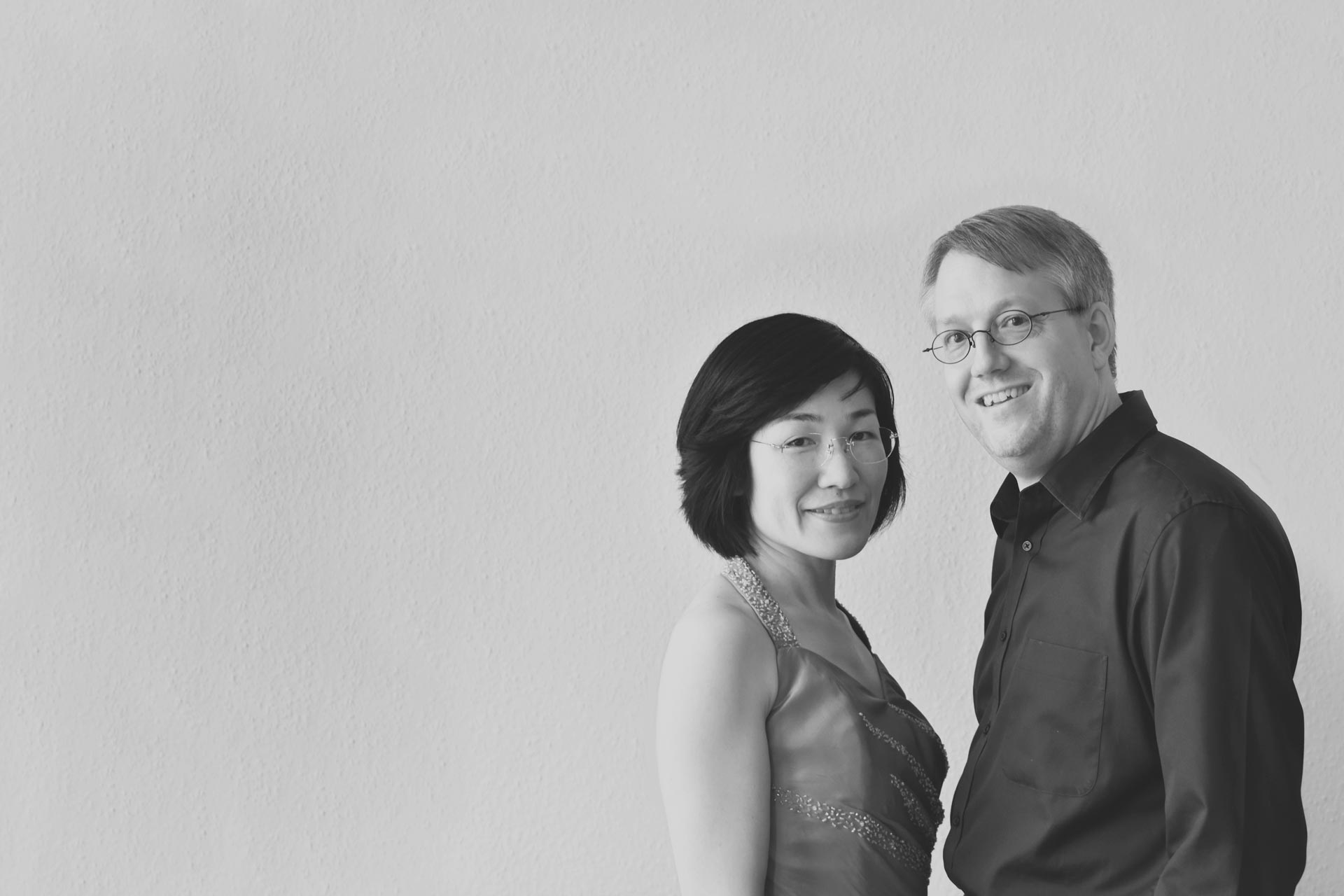BIOGRAPHY
Mariko and Volker Eckerle founded the Eckerle Piano Duo in 2006. The cleverly conceived concert programs of the German-Japanese duo are very popular with critics and audiences.
The press writes: “…the unity of these two musicians is a rare experience…” (Rhein-Neckar-Zeitung). The Mannheimer Morgen talks of a: “…masterly combination of technical refinement and expressive subtlety…”.
Along with central works of the piano duet repertoire, the Eckerle Piano Duo regularly plays rarely-heard pieces and works together with other musicians, actors and ballet companies. Besides concert lectures, the duo also proposes special programmes for children and families.
Their debut CD with NAXOS appeared in 2009: a highly acclaimed recording of waltzes by Antonín Dvořák (world premiere recording), Wolfgang Rihm, Max Reger and Sigfrid Karg-Elert. Leading German radio stations (Deutschlandradio Kultur, Südwestrundfunk, Hessische Rundfunk, Norddeutsche Rundfunk and Radio Berlin-Brandenburg) have presented this CD in detail. The specialised Japanese magazine Record Geijutsu writes about the CD: "The Eckerle Piano duo remarkably characterises each individual waltz". The Badischen Neuesten Nachrichten talks of: “… a terrific debut”.
In addition to concerts in European countries, the Eckerle Piano Duo is a regular guest in Japan and performs in numerous festivals.
REPERTOIRE
Programmvorschläge:
Robert Schumann: Sämtliche Ouvertüren
Ouvertüren zu "Hermann und Dorothea" op. 136, "Manfred" op. 115, "Faustszenen", "Genoveva" op. 81, "Julius Caesar" op. 128 und "Braut von Messina" op. 100
"Robert und Clara Schumann"
Werke von Robert und Clara Schumann inklusive des für Clara komponierten Klavierkonzertes op. 54
Repertoire von Robert Schumann im Detail:
Symphonie Nr. 1 B-Dur op. 38 „Frühlingssymphonie“ (1841)
Bearbeitung: Robert / Clara Schumann (1842)
Streichquartett a-Moll op. 41 Nr. 1 (1842)
Bearbeitung: Otto Dresel / revidiert von R. Schumann (1852)
Streichquartett F-Dur op. 41 Nr. 2 (1842)
Bearbeitung: Otto Dresel / revidiert von R. Schumann (1852)
Streichquartett A-Dur op. 41 Nr. 3 (1842)
Bearbeitung: Otto Dresel / revidiert von R. Schumann (1852)
Klavierquintett Es-Dur op. 44 (1842)
Bearbeitung: Clara Schumann (1858)
Andante und Variationen op. 46 (1843)
2 Klaviere plus Horn und 2 Celli
Ouvertüre, Scherzo und Finale op. 52 (1841)
Bearbeitung: Clara und Robert Schumann (1847)
Konzert für Klavier und Orchester op. 54 (1841/45)
Bearbeitung: August Horn (1864)
Studien für den Pedalflügel op. 56 (1845)
Bearbeitung: Theodor Kirchner (1888)
Symphonie Nr. 2 C-Dur op. 61 (1845/46)
Bearbeitung: Robert / Clara Schumann (1849)
Bilder aus Osten op. 66 (1849)
Ouvertüre zu „Genoveva“ op. 81 (1847)
Bearbeitung: Robert Pfretzschner, revidiert von R. Schumann (1852)
Für kleine und große Kinder Op. 85 (1849)
Konzertstück für 4 Hörner und Orchester op. 86 (1849)
Bearbeitung als „Großes Duo zu vier Händen“, anonym (1864)
Symphonie Nr. 3 Es-Dur op. 97 „Rheinische“ (1850)
Bearbeitung: Carl Reinecke, revidiert von R. Schumann (1851)
Ouvertüre zur „Braut von Messina“ op. 100 (1851)
Bearbeitung: Heinrich Enke, revidiert von R. Schumann (1851)
Ball-Szenen op. 109 (1849 -51)
(Auszüge)
Ouvertüre zu „Manfred“ op. 115 (1849)
Bearbeitung: Carl Reinecke, revidiert von R. Schumann (1853)
Zwischenaktmusik aus „Manfred“ op. 115 (1849)
Bearbeitung: August Horn (1862)
„Rufung der Alpenfee“ aus „Manfred“ op. 115 (1849)
Bearbeitung: August Horn (1862)
Symphonie Nr. 4 d-Moll op. 120 (1841/1853)
Bearbeitung: Robert Schumann (1853)
Ouvertüre zu „Julius Caesar“ op. 128 (1852)
Bearbeitung: Woldemar Bargiel, revidiert von R. Schumann (1854)
Kinderball op. 130 (1853)
(Auszüge)
Ouvertüre zu „Hermann und Dorothea“ op. 136 (1851/52)
Bearbeitung: Robert Schumann (1852, 1857 aus dem Nachlass herausgegeben)
Ouvertüre zu den „Faustszenen“ (1853)
Bearbeitung: Woldemar Bargiel (1860)
„Vier Hände im Dreivierteltakt“ – Walzer für Klavier zu vier Händen
Werke von Johannes Brahms, Franz Schubert, Antonín Dvořák, Max Reger, Sigfrid Karg-Elert, Paul Hindemith, Wolfgang Rihm u. a.
Ludwig van Beethoven – Sämtliche Werke für Klavier zu vier Händen inklusive der Klavierfassung der „Großen Fuge“ op.134 des Komponisten
Peter Tschaikowski „Schwanensee“
Bearbeitung für Klavier zu vier Händen von Mariko Eckerle
Märchen mit Musik
„Für kleine und große Kinder“ - Moderiertes Konzert mit Originalwerken für Klavier zu vier Händen
Maurice Ravel „Ma mère l’oye“, Hiroshi Aoshima „Mon père l’oie” und Robert Schumann „12 Klavierstücke für kleine und große Kinder“ op.85
„Bessres kenne ich nicht!“ – Fanny Hensel und Felix Mendelssohn Bartholdy – eine musikalisch-literarische Soirée




